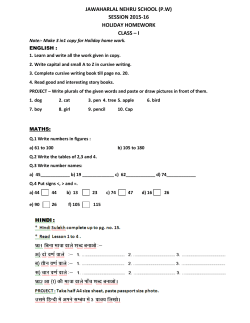
EAST AYRSHIRE COUNCIL CABINET â 1 APRIL 2015 HOLIDAY
EAST AYRSHIRE COUNCIL CABINET – 1 APRIL 2015 HOLIDAY PAY Report by the Acting Depute Chief Executive (Strategic Lead: Safer Communities) PURPOSE OF REPORT 1. The purpose of this report is to make recommendations to Cabinet in respect of the payment of holiday pay following recent changes in case law. BACKGROUND 2. The right to a paid holiday is provided for by the Working Time Regulations 1998. These Regulations implement within the United Kingdom what is now provided for by the Working Time Directive 2003 (2003/88/EC, replaced Directive 93/104/EC). 3. The case law relating to holiday pay has developed significantly over the last 12 months. In particular, on 22 May 2014, the European Union Court of Justice (CJEU) issued its judgement in the case of Lock-v-British Gas Trading Limited. Whilst this case considered whether the commission received by a salesman should form part of a calculation for holiday pay purposes, the CJEU determined that all pay elements intrinsically linked to the performance of the tasks being carried out under the terms of a contract of employment should be included in the calculation of holiday pay. This principally refers to overtime payments. Only occasional or ancillary costs, such as out of pocket expenses could be excluded from the calculation, such as travel or subsistence costs. 4. In separate, but related cases, the Employment Appeal Tribunal (EAT) handed down a judgment on 4 November 2014 regarding the cases of Bear Scotland Ltd and Others v Fulton, Hertel (UK) Ltd-v-Woods and Others; and Amec Group Ltd-v-Law and Others. Before this ruling, voluntary overtime was not included when calculating a worker’s rate of holiday pay. 5. The EAT judgment has clarified that: Workers should have non-guaranteed or voluntary overtime as well as contractual overtime taken into account when they are being paid annual leave. In order to make a claim to an Employment Tribunal an employee must have had an underpayment for holiday pay within three months of lodging the claim. If a claim involves a series of underpayments, any claims for the earlier underpayments will fail if there has been a break of more than three months between such underpayments. 6. The EAT has, however, granted the parties leave to appeal to the Court of Appeal (in respect of the English proceedings). Leave to appeal to the Court of Session (in respect of the Scottish proceedings) may well be sought and granted. Thereafter, there may be further appeals to the Supreme Court, the UK’s final court of appeal. It may therefore be some time before the law is settled. However, at this stage, the Trade Union Unite which was a party to the Bear case has decided not to appeal the judgement. 7. The Judgment relates to the calculation of holiday pay in respect of the 4 weeks’ holiday (20 days) derived from the European legislation and not the additional 1.6 weeks’ holiday granted through UK legislation. NEW LEGISLATION 8. The Government has recently announced that changes will be made to Regulations made under the Employment Rights Act 1996 which will limit claims for back payment of holiday pay to two years. Employees will still need to show that a series of deductions or underpayments occurred during that period. Also, as set out in paragraph 5 above, any break in the series of 3 month periods or more will break the series of deductions and limit the claims. 9. However, employees will be able to make claims under the existing rules until 1 July 2015 as these changes will be introduced only for claims made on or after 1 July 2015. While this may limit the impact of large backdated claims arising from the EAT’s ruling in the above EAT cases there is still the scope for claims to be submitted up to July 2015 with a potential backdating period to 1 January 2014 being the start of annual leave year in 2014. However, it is acknowledged that if an employee sought to make a claim for backdated holiday pay through the courts the potential backdate period would be 5 years. 10. However, the new legislation will make it clear that the right to paid holiday is not incorporated as a term in employment contracts which will avoid employees being able to make claims through the courts for back pay for 5 years in Scotland. PROPOSALS 11. In the meantime, the Council requires to make decisions in respect of two aspects relating to holiday pay. The first decision relates to the future arrangements required to ensure that the issues covered in the recent cases are addressed. The second relates to how the Council addresses the issue of backdating. 12. It is proposed that the Council make appropriate payments for holiday pay with effect from 1 January 2015. This settlement date is in line with the principle used by those 18 Councils who have so far implemented arrangements in respect of holiday pay. The first date on which holiday pay will be included in employees’ pays will be in the week four pay of either 12 May or 9 June 2015. 13. It is proposed that payments in respect of holiday pay will be made utilising the established arrangements in respect of holiday pay for casual workers and term-time employees which involves applying an 8.3% (20 days holiday/241 work days available x 100) uplift to the pay elements covered by the payment. This 8.3% uplift will be paid on all non-contractual payments made to an employee other than genuine out of pocket expenses payments such as subsistence or mileage costs. 14. Utilising the 8.3% uplift obviates the need for detailed calculations in respect of each employee and can be readily implemented using established payroll management arrangements. Further, this methodology has been used by the other eighteen Councils who have so far made payments for holiday pay. Comparative data from a sample of calculations using the two methods showed that there was only a marginal difference in the costs associated with using the 8.3% calculator and this would be offset by the reduced administration required of it which would otherwise require alignment of additional payments with actual holidays taken. For the backdated element of the settlement with effect from 1 January 2015 the 8.3% uplift will be made on the actual additional payments made during the period 1 January to 12 May or 9 June 2015. 15. The actual payment to an employee in respect of holiday pay will be as set out in the following example:Overtime payment 8.3% of overtime payment £100 £8.30 The holiday pay payment will be identified on an employee’s pay slip as accrued holiday pay which will enable employees to be aware of the payment being made to them regarding holiday pay, for example:Basic salary Overtime Accrued holiday pay Total payment £1,000 £100 £8.30 £1,108.30 16. The above proposal will ensure that the Council meets its future obligations in respect of holiday pay. The position in relation to back pay is less certain as it is impacted by ongoing legal considerations. 17. On the basis of previous patterns, it is estimated that around 3,300 employees will be subject to the foregoing arrangements in any one leave year. CURRENT CLAIMS 18. The Trade Unions have submitted 293 claims for payment of holiday pay to the Employment Tribunal. Further, the Trade Unions representing the Local Government Employee workgroup have submitted a collective grievance in relation to holiday pay accrual. The Trade Unions agreed previously to put this grievance on hold until it was confirmed how the Council would be addressing the issue. 19. The Trade Unions have been advised of the proposals set out in this report. At this stage it is not clear what their position is in respect of either the proposals or their grievance. TEMPORARILY UNDERTAKING HIGHER DUTIES 20. At present, Local Government employees undertaking higher duties receive a payment from day one based on the percentage of higher duties they actually undertake. The duties must be at a higher level and outwith the demands of their current job. 21. Employees do not receive this responsibility payment when on annual leave, sick leave or maternity leave. However, employees who are appointed on a temporary contract receive their full salary when on annual leave or sick leave (subject to individual sick pay entitlement). 22. To establish parity between those on a temporary contract to reflect the undertaking of additional duties and those receiving a responsibility payment with no change to their contract, it is proposed that with effect from 1 April 2015, employees undertaking higher duties for a minimum period of four continuous weeks will receive the responsibility payment when on annual leave or sick leave. Payment will cease if the employee is on sick leave for a minimum of four continuous weeks. 23. Employees who undertake higher duties for periods less than four continuous weeks will receive the 8.3% uplift in the same manner as the proposal set out in paragraph 13. POLICY/LEGAL IMPLICATIONS 24. The proposals set out above will ensure that the Council meets its statutory obligations in respect of the relevant employment legislation. FINANCIAL IMPLICATIONS 25. The financial implications associated with paying holiday pay on the basis set out above will in future financial years be around £320,000 per annum on the basis of current levels of additional payments. The additional cost in 2014/15 of implementing from 1 January 2015 will be around £80,000. 26. The backdated element will be met from uncommitted general fund balances. The recurring costs will also be met from the uncommitted general fund in 2015/16, with this recurring element being reflected in budget allocations from 2016/17 onwards. 27. Additional costs associated with the changes to the conditions relating to employees undertaking higher duties will be met from existing Service budgets. TRADE UNIONS 28. COSLA representatives met with Trade Union representatives during 2014 into 2015 on the possibility of working together to identify a potential settlement on a national framework which would reduce or minimise the costs associated with any claims for back pay. Those discussions have not reached any agreement and therefore it is for each Council to conclude matters. 29. As indicated in paragraphs 18 to 19 the Trade Unions have submitted a collective grievance which they have suspended pending the Council’s consideration of holiday pay. RECOMMENDATIONS 30. Cabinet is recommended to:(i) agree that with effect from 1 January 2015 the 8.3% uplift be used to pay backdated and future payments of holiday pay; (ii) agree the proposal that with effect from 1 April 2015, Local Government Employees undertaking higher duties for a minimum period of 4 continuous weeks will receive the responsibility payment concerned when on annual leave or sick leave; (iii) note that the Trade Unions have been advised of the Council’s intended action; and (iv) otherwise note the contents of the report. Christopher McAleavey Acting Depute Chief Executive: Safer Communities 24 March 2015
© Copyright 2025









